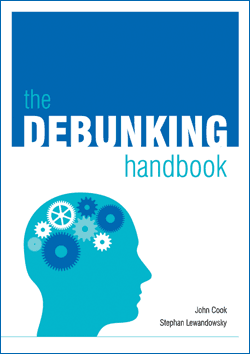Debunking Handbook: update and feedback
Posted on 23 January 2012 by John Cook
 When we published the Debunking Handbook, I have to admit, we completely underestimated the impact it would make. A few days after the launch, it suddenly went viral with over 150,000 downloads in a single day. This week, it just ticked over 400,000 downloads. We always planned that the Handbook would be useful not just for climate myths but for communicators having to deal with any type of misinformation. Nevertheless, it was surprising to see the Handbook featued on websites as diverse as Richard Dawkins and Silobreaker. A website devoted to debunking MLM myths saw it as "useful when debating with brainwashed members of MLM organizations". A Muslim forum speculated that it "Should be useful when engaging people who believe lies about Islam". Currently, several educators are looking to integrate it into their curriculum.
When we published the Debunking Handbook, I have to admit, we completely underestimated the impact it would make. A few days after the launch, it suddenly went viral with over 150,000 downloads in a single day. This week, it just ticked over 400,000 downloads. We always planned that the Handbook would be useful not just for climate myths but for communicators having to deal with any type of misinformation. Nevertheless, it was surprising to see the Handbook featued on websites as diverse as Richard Dawkins and Silobreaker. A website devoted to debunking MLM myths saw it as "useful when debating with brainwashed members of MLM organizations". A Muslim forum speculated that it "Should be useful when engaging people who believe lies about Islam". Currently, several educators are looking to integrate it into their curriculum.
Here are some excerpts from reviews of the Debunking Handbook:
"I simply cannot believe that John Cook of Skeptical Science and psychologist Stephan Lewandowsky managed, in just 8 pages, to create something as magnificent as their new Debunking Handbook... As someone who teaches science communication, I’m going to recommend Cook’s and Lewandowsky’s handbook to as many folks as I can find."
Chris Mooney, Desmogblog"...a must-read summary of the scientific literature on how to extract pernicious myths from people’s minds and restore fact-based knowledge."
Brad Johnson, Think Progress"I have to say that Cook and Lewandowsky have done a great job of clearly and succinctly outlining the challenge(s) and providing actionable paths forward to deal with them... In short, consider the Debunking Handbook a must read and a must keep reference."
A Siegel, Daily Kos
There were a few criticisms also. A science communicator from the University of Western Australia (a colleague of Stephan Lewandowsky) pointed out that in our case study debunking on Page 6, we weren't practising what we preach by using a graphic that emphasised the myth rather than the core facts. Fair point. So we've updated our example debunking and also made a minor tweak to the text on The Overkill Backfire Effect. Click here to download the updated Debunking Handbook.
This post was cross-posted at Shaping Tomorrow's World.































 Arguments
Arguments























 0
0  0
0






Comments